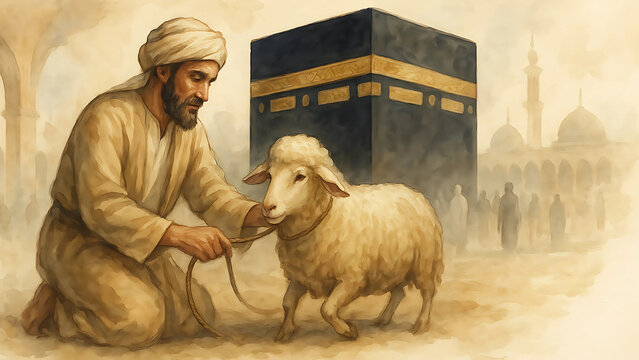Every year, Muslims across the globe commemorate Eid al-Adha, also known as the Festival of Sacrifice. At the heart of this sacred occasion lies a deeply symbolic and spiritual act known as Udhiyyath (also referred to as Qurbani). The Udhiyyath sacrifice in Islam carries historical, religious, and ethical significance, reminding believers of submission, obedience, and compassion.

What is Udhiyyath: The sacrifice in Islam?
Muslims perform Udhiyyath, the ritual animal sacrifice, during the days of Eid al-Adha (10th to 13th of Dhul-Hijjah, the final month of the Islamic calendar). The Udhiyyath sacrifice in Islam honors the unwavering faith and obedience of Prophet Ibrahim (AS), who prepared to sacrifice his beloved son Ismail (AS) in submission to Allah’s command. At that pivotal moment, Allah intervened and replaced Ismail with a ram, transforming the event into a lasting symbol of surrender to divine will. Through this sacred act, believers demonstrate their devotion and commitment to Allah.
Religious Significance
The Qur’an says:
“It is not their meat nor their blood that reaches Allah: it is your piety that reaches Him.”
(Surah Al-Hajj: 37)
Udhiyyath is not merely about slaughtering an animal—it is a spiritual practice that demonstrates our willingness to give up what we love for the sake of Allah. It is a test of sincerity, humility, and generosity.
Which Animals Can Be Sacrificed?
Muslims performing the Udhiyyath sacrifice in Islam can choose from specific types of animals, depending on availability and intention. Individuals may offer sheep or goats, with each animal allocated to one person. In contrast, up to seven people can share in the sacrifice of larger animals like cows, buffaloes, or camels. However, not every animal qualifies. To be valid, the animal must be healthy, free from any defects, and must meet the required age—at least 1 year for sheep and goats, 2 years for cows, and 5 years for camels. These conditions ensure that the sacrifice reflects sincerity, respect, and adherence to Islamic guidelines.
Who is Required to Perform Udhiyyath?
Udhiyyath is wājib (obligatory according to Hanafi school) or sunnah mu’akkadah (emphasized sunnah in other schools) for Muslims who:
Are adults (reached puberty)
Are sane
Possess wealth above the nisab threshold (minimum amount of wealth requiring zakat)
How is Udhiyyath Performed?
Intention (Niyyah): Begin with a sincere intention to please Allah.
Timing: The sacrifice must be done after the Eid prayer, between 10th and 13th Dhul-Hijjah.
Method: The slaughter should be done humanely, invoking the name of Allah:
“Bismillah, Allahu Akbar”Distribution of Meat:
1/3 for the family
1/3 for relatives and friends
1/3 for the poor and needy
The Spirit Behind the Sacrifice
More than the act itself, Udhiyyath reminds us of:
Obedience to Allah even when it is difficult.
Compassion and care for the less fortunate.
Unity in the Ummah, as Muslims around the world share in this noble practice.
It fosters humility, charity, and gratitude—values much needed in today’s world.
Conclusion
Udhiyyath offers a powerful opportunity for parents to teach their children about core Islamic values. Through this meaningful act, families can share the story of Prophet Ibrahim (AS), while also instilling the importance of empathy, generosity, and faith.
More than just a ritual, the Udhiyyath sacrifice in Islam celebrates devotion, unity, and compassion. As Eid al-Adha approaches, embrace the spirit of Udhiyyath by reflecting on your own sacrifices. Use this time to deepen your connection with Allah and actively engage in acts that strengthen your bond with family and the wider community.
